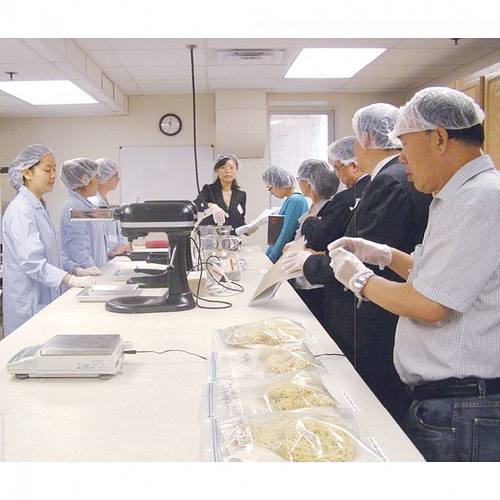
A Chinese delegation observes methods used to prepare noodles with dry bean flour during a reverse trade mission site visit to the University of Nebraska-Lincoln. The Foreign Agricultural Service’s (FAS) Agricultural Trade Office (ATO) in Beijing recently partnered with the U.S. dry edible bean industry to launch a program that aims to pack more protein into Chinese diets. (Courtesy University of Nebraska-Lincoln)
The Foreign Agricultural Service’s (FAS) Agricultural Trade Office (ATO) in Beijing recently partnered with the U.S. dry edible bean industry to launch a program that aims to pack more protein into Chinese diets.
The Nebraska Department of Agriculture (NDA), along with the Nebraska Dry Bean Commission (NDBC), joined the FAS Beijing ATO to begin a program to promote the use of U.S. dry beans within China. NDA and NDBC funded research at the University of Nebraska-Lincoln to show how dry beans can be used in various ways. For example, dry beans may be ground into flour and added to pastry flour to increase the nutritional value of noodles, which are a staple in the Chinese diet. Traditionally, China has used dry beans for bean paste or soup but little else. Read more »
As drought continues across America today, President Obama and I are committed to taking every possible step to help farmers and ranchers, businesses, and communities recover when disaster strikes.
Meanwhile, it is disappointing to many in rural America that Congress has not taken action on a comprehensive, multiyear Food, Farm and Jobs Bill that would give rural families more certainty in a tough time. I continue to remind folks in Washington that we need a comprehensive Food, Farm and Jobs Bill as soon as possible to keep rural America growing in the years to come.
Especially in a time of drought, we’re reminded of the great importance that conservation of our natural resources plays in the lives of all Americans – and today USDA continues its record efforts to conserve, restore, and protect America’s land and water.
Since 2009 USDA has partnered with more than half a million private landowners to enroll a record number of acres in conservation programs. We’ve accelerated protection of critical wetlands, enrolling more than 800,000 acres in programs to enhance water availability. Read more »
Staff from USDA’s Foreign Agricultural Service (FAS) were among 71 participants who attended the 2012 Hard Spring and Durum Wheat Quality Tour across the northern plains July 23-26.
The U.S. Wheat Quality Council sponsors the annual tour, enabling attendees to assess the yield of the current year’s wheat crop – even before it is harvested – and to network with specialists in the wheat quality field.
Overall, it was a very good wheat crop, and the Wheat Quality Council predicts it’s the third-highest yield ever. Thanks to early planting, the wheat matured enough to escape the extreme heat of the summer, allowing for higher protein levels and, ultimately, a good harvest that can be readily exported. Read more »

Click for larger image.
Most people reading this probably have heard the statistic by now that one in six Americans, or 48 million people, is expected to get sick from foodborne illness each year. You also probably have a lot of questions about what federal public health agencies are doing to prevent those illnesses, and what precautions you can take to further protect yourself and your family. Read more »

USDA Support helps Mrs. Gerry’s, an Albert Lea, Minn. Business grow and create jobs. ( From left its Colleen Landkamer, USDA Rural Development Minn. State Director; Chad Vogt, Mrs. Gerry’s, Inc.; and Under Secretary Dallas Tonsager.
What started as a small operation almost 40 years ago has grown into major contributor to the economy in Albert Lea, Minn.
Mrs. Gerry’s Kitchen, Inc., started on Dec. 4, 1973, in a building that occupied 1,100 square feet. Today, Mrs. Gerry’s is adding a 36,500 square-foot addition that will bring its building to over 100,000 square feet and help meet growing customer demand for its real (no flaky stuff here) mashed potatoes and other products. Read more »
In an effort to advance food and agricultural research that enables farmers and ranchers to meet the growing global demand for food, U.S. Department of Agriculture’s (USDA) Chief Scientist Catherine Woteki will lead the U.S. Government’s delegation to the first-ever Meeting of Agricultural Chief Scientists (MACS) in Guadalajara, Mexico this week. Member countries committed to the meeting earlier this year at the June 2012 G-20 Leaders Summit, as a step to gain greater efficiency and utility from global agricultural research investments. The meeting is being convened by the Mexican government as part of their role heading the Group of Twenty (G-20) this year.
“Over the next 50 years, we will need to produce as much food for the world’s population as has been produced in the entire history of mankind,” said Woteki, who is also USDA’s Under Secretary for Research, Education and Economics. “A challenge this serious and urgent requires bringing together the best minds in food and agricultural science to chart our course on research. This meeting is the first of its kind, and I believe it is the beginning of a collaboration that will benefit scientists, farmers, and citizens around the world.” Read more »



